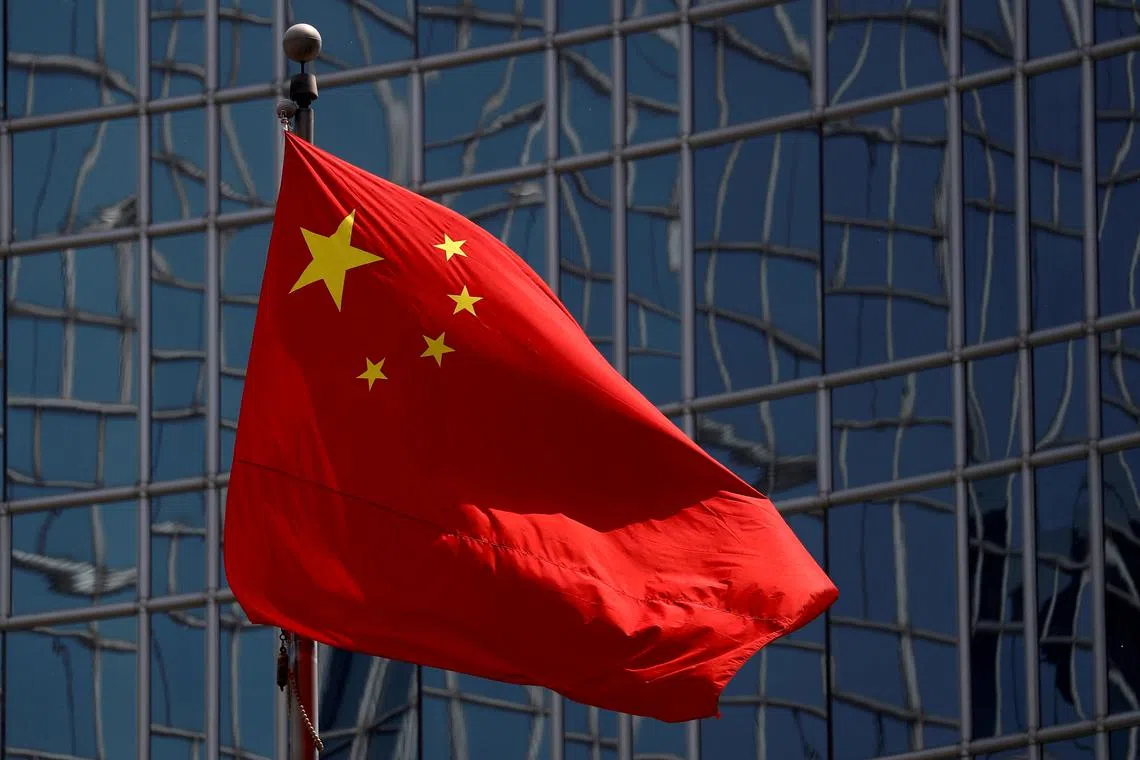British PM takes nuanced approach to China threat in defence plan
Sign up now: Get ST's newsletters delivered to your inbox

Prime Minister Rishi Sunak took a fresh look at Britain's approach to China and came to a different conclusion from his predecessor about the strategic threat the Asian country posed.
PHOTO: REUTERS
Follow topic:
LONDON – Prime Minister Rishi Sunak will face down critics in his ruling Conservative Party who have called on him to denounce China as a strategic threat to Britain’s security, instead offering a more nuanced approach to relations with Beijing as he sets out his country’s foreign-policy priorities.
Mr Sunak’s predecessor Liz Truss had intended to designate China a strategic threat in an update to Britain’s so-called Integrated Review, or IR, of defence and security. After economic turmoil led to an abrupt end to Ms Truss’ tenure, Mr Sunak – more emollient in his approach – took a fresh look at the strategy and came to a different conclusion about the threat.
“It’s a regime that is increasingly authoritarian at home and assertive abroad and has a desire to reshape the world order,” Mr Sunak told reporters on his way to the United States on Sunday. “We’ve recognised it as the biggest state-based threat to our economic security.”
Still, China’s economic power and 1.5 billion people mean it cannot be dismissed and “that’s why in the IR you will see a very thoughtful and detailed approach to China,” he said.
Mr Sunak is visiting San Diego for talks with allies – US President Joe Biden and Australian Prime Minister Anthony Albanese – to unveil the next phase of the Aukus nuclear submarine programme,
While campaigning for the Conservative Party leadership in 2022 against the hawkish Ms Truss, Mr Sunak described China as the biggest long-term threat facing Britain.
Since taking office, his approach has been more nuanced, acknowledging the need to trade with the nation and the need for diplomatic relations, not least because of the strategic importance of the Taiwan Strait in allowing the safe passage of container ships to the rest of the world.
Mr Sunak added that the Communist Party of China’s military, financial and diplomatic activity represented an “epoch-defining challenge”.
Asked by reporters if he would like to visit Beijing as other world leaders are planning, Mr Sunak replied: “It’s not about going there or not going there. I think engagement is the point.”
China-sceptic Alicia Kearns, the Conservative MP who chairs Parliament’s Foreign Affairs Committee, said in an interview that she welcomes “the recognition of the threat of China”.
“But this threat cannot be seen as primarily economic, that is to fail to understand China is foremost seeking to undermine our national security and sovereignty,” she said. “Because no country can have economic security without national security.”
Former Conservative Party leader Iain Duncan Smith called the updated strategy “a wasted opportunity to call out China as they are, a threat to our way of life and physically to us”.
“By being weak in facing China, China doesn’t respect us. If we don’t show strength they won’t respect us. Project Kowtow is alive and well,” Mr Smith, a long-time critic of Beijing, said in an interview.
But the Premier said an updated foreign and security policy would show Britain is “ready to stand our ground” and “ensure we are never vulnerable to the actions of a hostile power”. He also rejected pleas to increase defence spending to 3 per cent of the size of the economy.
Mr Sunak will pledge £5 billion (S$8.1 billion) on defence in 2023 and 2024, although large parts of the settlement will be swallowed up by replenishing ammunition stockpiles given to Ukraine and work on the Australian submarine project.
The funding is only around half of what Defence Secretary Ben Wallace had reportedly requested as the military budgets are squeezed by the impact of the conflict in Ukraine, inflation and the weakness of the pound sterling.
Speaking to reporters travelling with him to the US, Mr Sunak set out an ambition to increase defence spending to 2.5 per cent of gross domestic product in the longer term, with further spending to be set out in 2025.
Britain was already on a trajectory to reach 2.5 per cent by 2030 under plans set out under former premier Boris Johnson, and Mr Sunak’s plans are likely to draw criticism from the military and hawks in his ruling Conservative Party. He was speaking ahead of Britain’s budget statement on Wednesday. BLOOMBERG

